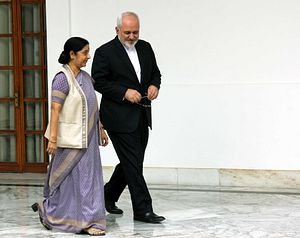As U.S.-Iran tensions rise in the Middle East, Iran’s Foreign Minister Javad Zarif was in New Delhi this week for discussions with External Affairs Minister Sushma Swaraj to seek India’s support in the ongoing crisis with Washington. India seems to have conveyed that any decision on oil purchases from Iran will have to wait for the conclusion of parliamentary elections presently underway. While Zarif described his talks with India as “excellent” and blamed the U.S. for “escalating the situation in the region,” New Delhi was circumspect about the outcome.
India ceased purchasing Iranian oil this month after the United States refused to extend waivers on its oil trade with Iran. India was the second largest buyer of oil from Iran after China and Iranian oil exports have come down to less than 1 million barrels per day (bpd) from a peak of 2.8 million bpd last year with suggestions that it is likely to decline to as low as 500,000 bpd from this month.
The Trump administration’s decision to lift sanctions waivers from eight countries that import Iranian oil so as to bring Iran’s exports down to “zero” is an attempt to cripple the Iranian economy. Washington has ratcheted up economic sanctions on Iran and is trying to push its oil exports to zero to force Tehran to give up regional influence and scale back its military activities. In this, it has the backing of the Arab Gulf states and Israel. Against this backdrop, the United States suggested last week that it had received intelligence that Iran was planning some kind of attack against U.S. forces in the Middle East.
It has been reported that at the direction of John R. Bolton, Trump’s national security adviser, Washington has revised its military plans, which envision sending as many as 120,000 troops to the region should Iran attack American forces or resume work on nuclear weapons, though falling short of a full-fledged land invasion. In response, Iran made it clear that it would stop complying with some aspects of the nuclear deal it signed in 2015 and has given Europe two months to help it skirt American sanctions or risk Tehran’s shift on its atomic program. The Iranians, however, recognize that there is very little they have to gain by getting out of the nuclear deal because it would only put them under greater pressure from Europe and others around the world who might be in a position to help support them.
Meanwhile, U.S. Secretary of State Mike Pompeo made an unscheduled trip to Brussels earlier this week to discuss the Iranian situation with European leaders who remain worried that tensions between Washington and Tehran could boil over, possibly inadvertently. Last week, the U.S. sent an aircraft carrier, a Patriot missile defense battery, and a squadron of B-52 bombers to the Persian Gulf in a show of force to counter what the Trump administration believes is a growing threat from Iran. Iran, for its part, is likely to move short-range ballistic missiles and cruise missiles aboard boats in the region as well. Over the weekend, Tehran issued an explicit threat to the USS Abraham Lincoln, which transited through the Suez Canal by suggesting that while in the past, a U.S. aircraft carrier would be a threat, now, it is a “target.”
The regional situation is getting tenser by the day as exemplified by attacks on oil tankers over the weekend. Two Saudi Arabian oil tankers were attacked near the Strait of Hormuz, the kingdom’s energy minister said, sending oil prices higher. These tankers included two from Saudi Arabia as well as ships from Norway and the United Arab Emirates, which were in the Gulf of Oman off the UAE’s eastern coast as they prepared to cross into the Persian Gulf. Though Iran has not been called out for these attacks directly, some Iranian officials have threatened to close the Strait of Hormuz in response to the sanctions. At the UAE’s request, the United States is now working to establish who was behind the sabotage.
As tensions escalate in the Middle East, saber-rattling from all sides is at an all time high, which increases the danger of miscalculation or an accident. Both sides are signalling at the moment but there is no easy resolution in sight. Countries like India face the risk of being caught in this U.S.-Iran crossfire. As bilateral tensions between the United States and Iran threaten to embroil the entire region, the consequences for India will be quite serious. This would pertain to not only managing its energy security, for which it depends on regional stability in the Middle East, but would also be about India’s ability to navigate ties between the Arab world and Israel on the one hand and Iran on the other.
Iran is an important part of India’s energy security matrix, supplying around 10 percent of its total oil requirements. Moreover, given the concessionary terms offered by Tehran, Iranian oil is cheap and replacing it from alternative sources may lead to pressures on the Indian exchequer. In addition, India’s investment in the Chabahar port in Iran bears testimony to India’s strategic requirements in Afghanistan. At a time when ground realities are rapidly evolving in Afghanistan, India’s ties with Iran remain an important bulwark against Pakistani shenanigans. The access that Iran provides India to Afghanistan and the larger Central Asian region is critical for Indian strategic footprint in the region. But the Iranians are tough negotiators and New Delhi has often found it difficult to get its voice heard in Tehran. Now that Iran feels increasingly isolated, with the European Union unable to come up with an alternative and China relatively mute given its own troubles with the U.S., India has emerged as an important partner. It is an opportunity that New Delhi would do well to exploit to its own advantage. While Iran is important, India has equally significant stakes in the Arab Gulf states as well as the United States.

































